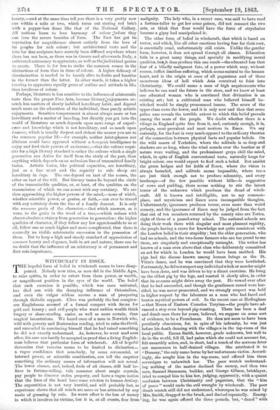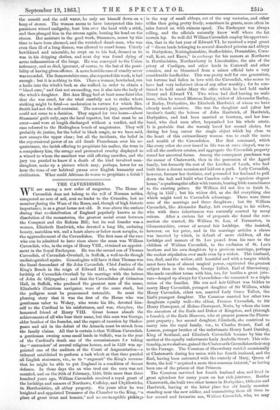WITCHCRAFT IN ESSEX.
THE hopeful form of belief in witchcraft seems to have disap- peared. Nobody now tries, as men did in the Middle Ages, to raise spirits, in order to extort from them power, or wealth, or magnificent position in the eyes of the world. The belief that such coercion is passible, which was once universal,
has died out with the decaying influence of Orientalism, and even the vulgar seldom accuse a man of prospering through diabolic support. Clive was probably the last conspicu- ous Englishman accused of a formal compact with Satan for gold and luxury ; and evil people who want sudden wealth think forgery or share-stealing easier, as well as more certain, than magical incantations. We heard once of a man in Norwich who, wild with poverty and Rosicrucian reading, tried to raise the Devil, and succeeded in convincing himself that he had raised something he did not exactly understand. As, however, he went mad soon after, his case can hardly be accepted as proof that a living English- man believes that particular form of witchcraft. All of hopeful demonism that remains seems to be limited to divination— a vague confidence that somebody, by some ceremonial, or Internal power, or scientific combination, can tell the enquirer something the ordinary means of information will not reveal. The lower classes, and, indeed, fools of all classes, still half be- lieve in fortune-telling, talk nonsense about magic crystals, pay people to discover stolen property, and have a vague notion that the lines of the hand have some relation to human destiny. The superstition is not very hurtful, and will probably last, as experience shows that all minds are more or less attracted by any mode of guessing by rule. Its worst effect is the loss of money in which it involves its victims, but it is, at all events, free from malignity. The lady who, in a recent case, was said to have used a fortune-teller to get her some poison, did not connect the two arts, or think that flour would have the force of strychnine because a gipsy had manipulated it.
The other form of belief in witchcraft, that which is based on terror, and which, like all other emotions having fear for their root, is essentially cruel, unfortunately still exists. Unlike the gentler form, however, it does not spread through all classes. Education fails in a great many things, and specially in modifying moral qualities, buit,it does produce this one result—the educated lose that fear of a blindly malignant fate, of a power which may, without reason, inflict limitless suffering, which seems natural to the human heart, and is the origin at once of all paganisms and of those monstrous ideas of hell which Asia contrived to foist into Christianity. We could name a man of high acquirements who believes he can read the future in the stars, and we know at least one educated woman who is convinced that divination is an existing art; but a cultivated man who believed himself be- witched would be simply pronounced insane. The scorn of the upper class cows the lower, and it is only now and then that some police case reveals the terrible extent to which this belief prevails among the mass of the people. We doubt whether there is a village in England quite free from it, and, curiously enough, it is, perhaps, most prevalent and most noxious in Essex. We say curiously, for the fact is very much opposed to the ordinary theories
of the connection between physical facts and popular beliefs. On the wild moors of Yorkshire, where the solitude is so deep and shadows are so long, where the wind sounds over the heather as if nature were wailing, and the predominant greys chill the mind, which, in spite of English conventional taste, naturally longs for bright colour, one would expect to find such a belief. But amidst the green hedges and fat fields of Essex, where the vision is always bounded, and solitude seems impossible, where trees are just thick enough not to produce solemnity, and every landscape—of the few possible without hills—is suggestive of cows and pudding, there seems nothing to stir the latent terror of the unknown which produces the dread of witch- craft. All is known and intelligible, not to say common- place, and mysticism and Essex seem incompatible thoughts. Unfortunately, ignorance produces terror, even more than weird scenery, and the ignorance of Essex may be judged from the fact that out of ten members returned by the county nine are Tories, eight of them of a passed-away school. The national schools are doing their work there with singular and most pleasant rapidity, the people having a crave for knowledge not quite consistent with the London belief in their stupidity; but the elder generation, who had no schools, and the two-horse farmers who are too proud to use them, are singularly and exceptionally untaught. The writer has known of a man even above that class who deliberately committed an act for which in London he would have been mobbed. His pigs had the disease known among human beings as the St.
Vitus's dance, and he was convinced that they were bewitched. Fortunately, he did not suspect any individual witch or murder might
have been Anne, and was driven to try a direct exorcism. He hung up the oldest pig by the legs, and roasted it slowly alive, in order that its screams might drive away the pest. He vowed ever after that he had succeeded, and though the gentlemen round were hor- rified, he was never prosecuted, and we strongly suspect was held in higher respect by the labourers as a man who had faced and beaten mystical powers of evil. In the recent case at Hedingham —that Mecca of Eastern Counties Toryism—the people have ad- vanced a step even beyond pig-roasting. There has been a deaf and dumb man there for years, believed, we suppose on some sort of evidence, to be a Frenchman. He does not seem to have been peculiarly obnoxious, for, in spite of his infirmity, he was just before his death dancing with the villagers in the tap-room of the local public. Emma Smith, however, grade unknown, but well to do in the world, fell ill, had pains which she could not account for, felt unearthly aches, and, in short, had a touch of the nervous fever
not uncommon in half-drained villages. She attributed it to "Dummy," the only name borne by her unfortunate victim. Accord- ingly, she sought him in the tap-room, and offered him three sovereigns to unbewitch her. The .poor wretch understand- ing nothing of the matter declined the money, and then two
• men, Samuel Stammers, builder, and George Gibson, bricklayer, tried to compel him to kiss her, judging, apparently, with a quaint confusion between Christianity and paganism, that the "kiss of peace " would undo the evil wrought by witchcraft. The poor dumb wretch still did not understand, whereupon he was seized by Mrs. Smith, dragged to the brook, and ducked repeatedly. Emerg- ing, he was again offered the three pounds, but, " dazed " with the assault and the cold water, he only sat himself down on a heap of stones. The woman seems to have interpreted this into persistent wizard malignity, beat him over the head with a stick, and then plunged him in the stream again, beating his head on the stones. Her assistant in the good work, Stammers, seems by this time to have been alarmed, and the wretched dumb man, who was even then ill of a lung disease, was allowed to crawl home. Utterly bewildered and miserable, he crept on to his bed, dressed as he was in his dripping clothes, and next day was found dying of acute inflammation of the lungs. He was conveyed to the Union infirmary, and so died, ignorant, of course, to the last of the possi- bility of having given offence. A. more horrible case of cruelty never was recorded. The Somersetshire case, also reported this week, is bad enough ; but it is nothing to this. 'I'nere a woman, bewitched, ran a knife into the witch's back as she walked, in order to obtain a "blood cure," and that not succeeding, ran it also into the body of the witch's daughter. But Ann Hogg had at least some faint idea that she was cruel, for she tried carefully not to strike where striking might be fatal—a moderation in torture fur which Mrs. Smith had not the self-restraint. The coroner's jury, nevertheless, could not come to a decision. They argued for two hours—about Stammers' guilt only, says the local reporter, but that must be an error—and were at length discharged without a verdict, and the case referred to the Hedinghain bench of magistrates. They will probably do justice, for the belief in black magic, as we have said, now annoys the upper class ; but all the incidents, the belief in the supernatural power of an old dumb Frenchman over his ac- quaintance, the lavish offering to propitiate his malice, the trust in a compulsory kiss, the savage and protracted cruelty displayed to a wizard to whom the assailant was still offering sacrifice, and the jury too puzzled to know if a death of the kind involved man- slaughter, make up a picture which may, perhaps, lower for an hour the tone of our habitual 'mans over English humanity and civilization. What could Africans do worse to propitiate a fetish ?































 Previous page
Previous page